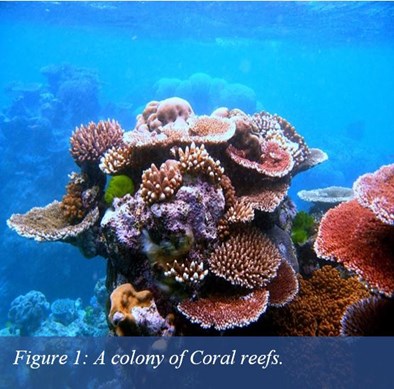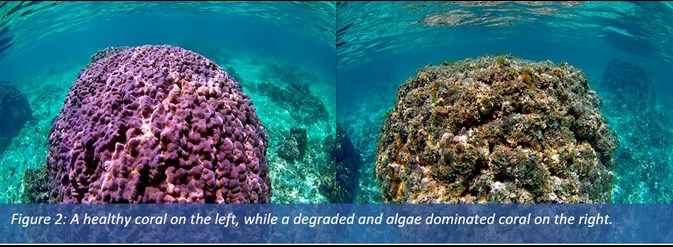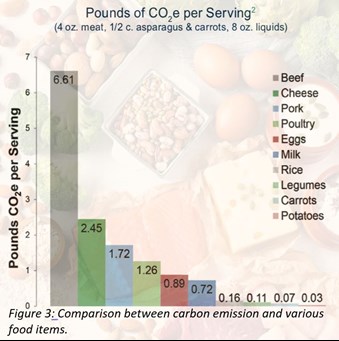Role of Oceans in Fighting Climate Change
Tuesday, July 2, 2019Oceans and Climate Change
The last blog covered the basics of climate change. We learned that the climate is changing at an increasing rate with the increase in greenhouse gas emissions. As a result, the current average surface temperature of our planet is 0.8° Celsius warmer than the pre-industrial era, which is causing problems like shrinking glaciers. Although this is alarming, the average surface temperature could have been worse without the important role that our oceans play. Oceans absorb greenhouse gases like Carbon Dioxide (CO2) with a remarkable efficiency. Out of all the CO2 released by humans over the last two centuries, oceans have adsorbed an estimated 38% of it. However, even the oceans are struggling to keep up with the human emitted CO2. Most of the energy trapped by the greenhouse gases, i.e., heat, is absorbed by the oceans, which is depleting their ability to absorb CO2. Oceans are also becoming more acidic due to excessive amount of CO2 dissolving in the water. As a result, in the past two centuries our oceans have become 30% more acidic.
Impact of Climate Change on Coral Reefs
Ocean acidification and ocean warming are causing problems like coral reef bleaching, slower growth rates of coral, and decline in their reproductivity. Although they look like plants, coral reefs are actually colonies of marine invertebrates that secrete calcium carbonate skeletal structures, which forms the “coral” that we see. They provide habitat and food to aquatic animals, including 25% of all ocean fish species. It takes years for coral reefs to develop and flourish, and they have a remarkable ability to recover from damage. However, they are bleaching at such a fast pace nowa-days that they are unable to recover as quickly (see Figure 1).
As a result, coral reefs all over the world are shrinking in size. The world’s largest coral system, the Great Barrier Reef, has declined by over 50% between 1986 and 2012 due to a variety of reasons, including typhoons, which are getting more severe due to the climate change, and bleaching. If the CO2 emissions continue to rise, 90% of all the world’s corals will experience bleaching by 2055. Besides the destruction of marine ecosystems, loss of corals around the world will also result in an economic disaster caused by the collapse of fisheries. Healthy coral reefs are the breeding ground for many species of marine fish and hope to the small fish (fingerlings) before they are mature. The livelihood of millions of people, who live on the coasts and rely on the fisheries, will be affected.
Tip: What Can We Do to Help the Oceans and Corals?
We need to reduce our production of greenhouse gases, particularly CO2. Food industry has one of highest greenhouse gas emissions among all other sectors. Meat production, for example, requires intense use of fossil fuels to cultivate the land, and to produce and apply chemicals (fertilizers/pesticides), and in some locations to irrigate with water, for the production of animal feeds. This produces high amounts of CO2. Therefore, eating meat, especially beef, contributes significantly toward climate change. Eating one kilogram of beef produces the equivalent carbon emissions of driving a Honda Civic for 176 km. While in comparison, eating one kilogram of lentils only causes emissions equivalent of driving it 6 km. Eating wild game and fish that is harvested sustainably from natural environments lowers your carbon footprint even more and helps to protect wildlife habitats. Therefore, by eating lower in the food chain, i.e., more plant-based diet, you can reduce your carbon emissions, help stop the climate change, and save our oceans and corals. Next installment: We will learn about the role of forests in fighting climate change.
Picture Credit
Ritiks, Source: Own Work, accessed on Feb 13, 2020, [picture cropped] Retrieved from https://commons.wikimedia.org/wiki/File:The_Coral_Reef_at_the_Andaman_Islands.jpg
Eco Café’s Phuket, accessed on Feb 13, 2020, Retrieved from https://www.flickr.com/photos/aeysea/4636282459/
Additional Readings
https://ocean.si.edu/ecosystems/coral-reefs/great-barrier-reef-going-going-gone
https://www.sciencedirect.com/science/article/pii/B9781856176361000122?via%3Dihub
Blog Posts
- What is Climate Change
- Drought: What Can We Do?
- Migration and Climate Change; a Complicated Relationship (Part 1)
- Migration and Climate Change; a Complicated Relationship (Part 2)
- Climate Change and Birds’ Resources
- Ladder to Extinction
- Arctic Warming and Ecosystem Impacts
- Climate Change Connection to Mountain Pine Beetle
- Tackling Climate Change Denialism
- Impact of Climate Change on Bluebirds
- An Introduction to Climate Change
- Great Decline of Aerial Insectivores
- Role of Oceans in Fighting Climate Change
- Role Of Forests In Fighting Climate Change
- Impact of Climate Change on Shorebirds
- Impact of Hurricanes and Climate Change on Birds
- An Introduction to Climate Change.
- Impact of Forest Fires, and Climate Change on the Nature
- Impacts of Climate Change on Owls
- Impacts of Climate Change on Birds of Prey
- Whitebark Pine and Clark's Nutcracker
- COVID 19 & The Environment
- Impact of Global Warming on Bird Anatomy and Colour Polymorphism
- Climate Change & West Nile Virus
- All Posts



